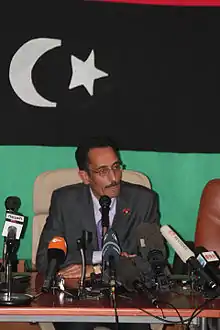Abdul Hafiz Ghoga عبد الحافظ غوقة | |
|---|---|
 | |
| Vice Chairman of the National Transitional Council of Libya | |
| In office 23 March 2011 – 22 January 2012 | |
| President | Mustafa Abdul Jalil |
| Prime Minister | Mahmoud Jibril Ali Tarhouni (Acting) Abdurrahim El-Keib |
| Preceded by | Position established |
| Succeeded by | Mustafa Honi |
| Personal details | |
| Born | 11 June 1957 Al-Azizya, Libya |
| Political party | Anti-Gaddafi forces |
Abdul Hafiz Ghoga (also known as Abdelhafed Abdelkader Ghoga, also spelled Ghogha; Arabic: عبد الحافظ غوقة; born 11 June 1957) is a Libyan human rights lawyer who rose to prominence as the spokesman for the National Transitional Council, a body formed in Benghazi during the 2011 Libyan civil war.[1] On 23 March 2011, he became the vice chairman of the council, serving in that post until he resigned on 22 January 2012 after protests against him.[2]
Abu Salim prison massacre
Abdul Hafiz Ghoga was actively involved in legal representation for the families of people killed in the 1996 Abu Salim prison massacre.[3]
2011 Libyan civil war
Ghoga was a member of the National Transitional Council created during the 2011 Libyan civil war[1] and acted as its spokesperson. Ghoga has argued that the council is working for a unified Libya, rather than letting rebel-controlled areas separate from areas controlled by Muammar Gaddafi; "There is no such thing as a divided Libya".[4]
On 27 February, he said that the council was not seeking foreign intervention.[5] On 20 March, he announced that over 8000 people opposed to Gaddafi had been killed. However, Armed Conflict Location and Event Data Project, which compiles a database of all reported fatalities due to political violence on the African continent, listed 6,109 fatalities from 15 February to 23 October 2011, of which 1,319 prior to NATO intervention.[6] Ghoga criticised a comment by Arab League Secretary-General Amr Moussa that was critical of the way in which the Libyan no-fly zone was implemented.[7] Ghoga stated, "Today, when the secretary general spoke, I was surprised. What is the mechanism that stops the extermination of the people in Libya, what is the mechanism, Mr. Secretary General? If the protection of civilians is not a humanitarian obligation, what is the mechanism that you propose to us?"[7]
Resignation
In January 2012, he resigned as Vice Chairman of the Transitional National Council.[8]
References
- 1 2 "Founding statement of the Interim Transitional National Council". National Transitional Council. 5 March 2011. Archived from the original on 10 March 2011. Retrieved 7 March 2011.
- ↑ Connor, Richard (22 January 2012). "Libyan deputy leader steps down after angry protests". Deutsche Welle. Retrieved 22 January 2012.
- ↑ "Libya: Governments Should Demand End to Unlawful Killings". Human Rights Watch. February 2011. Archived from the original on 26 February 2011. Retrieved 21 March 2011.
- ↑ Abbas, Mohammed (27 February 2011). "UPDATE 1-Libya rebels form council, reject Gaddafi talks". Reuters. Retrieved 28 February 2011.
- ↑ "Libya opposition launches council". Al Jazeera English. 27 February 2011. Archived from the original on 27 February 2011. Retrieved 28 February 2011.
- ↑ "ACLED Version 5 (1997–2014)". Armed Conflict Location and Event Dataset. Archived from the original on 22 May 2015. Retrieved 19 February 2015.
- 1 2 Perry, Tom (20 March 2011). "More than 8,000 Libyans killed in revolt – rebel". Reuters. Archived from the original on 23 March 2011. Retrieved 21 March 2011.
- ↑ "NTC deputy chief Abdel Hafiz Ghoga resigns". BBC. 22 January 2012. Retrieved 22 January 2012.
External links
- Profile at the NTC, with photo
- Abdul Hafiz Ghoga collected news and commentary at Al Jazeera English